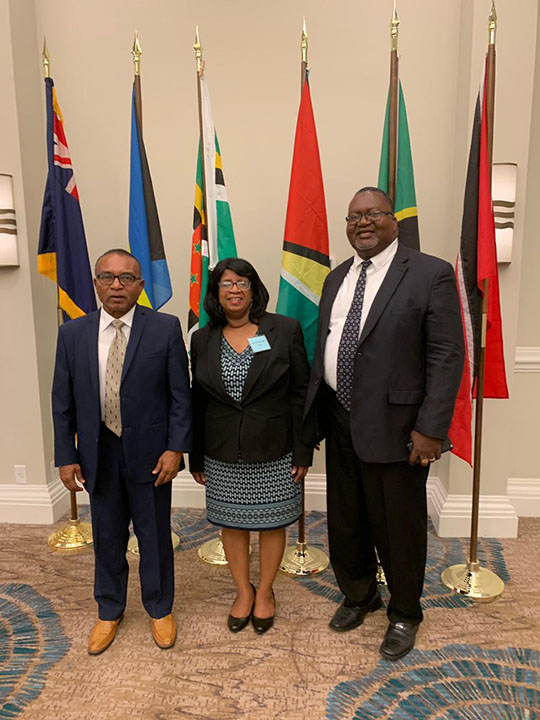Anti-corruption organisations of the Commonwealth Caribbean have agreed to a number of actions to strengthen their work and have highlighted the need to maintain their independence, impartiality and professionalism, to further enhance their effectiveness.
The Commonwealth Caribbean Association of Integrity Commissions and Anti-Corruption Bodies held its fifth Annual Regional Conference in the Cayman Islands from June 3rd to 7th under the theme ‘Transforming Words into Action: Revitalising the Fight Against Corruption’.
The Commonwealth Secretariat-affiliated grouping, made up of the heads of national commissions, aims to help Caribbean countries to cooperate across borders, exchange best practices and develop regional anti-corruption initiatives. It was established in June 2015 and members are Antigua and Barbuda, The Bahamas, Barbados, Belize, Dominica, Grenada, Guyana, Jamaica, Saint Lucia, St Kitts and Nevis, St Vincent and the Grenadines, and Trinidad and Tobago.
At last week’s conference, Chairman of Guyana’s Integrity Commission, Kumar Doraisami, was elected as a member of the association’s Executive Committee for the 2019/2020 period, according to the Conference Communique issued at the end of the meeting.
The local Integrity Commission has been in the spotlight in recent times as, after it was reconstituted a year ago, over the past several months it has begun to publicly name public officials who have failed to file declarations of their assets and liabilities in keeping with the law. Recently, it was revealed – though not by the commission – that President David Granger has not fully declared his assets and liabilities. Questions have been asked about why his name was not among the names of errant public officials published.
There have also been calls for the commission to act against errant public officials as they have been given enough time to comply, and Doraisami has said that legal action will be taken against those who have failed to file their declarations. Guyana’s Integrity Commission Act mandates holders of certain public offices to declare their assets and liabilities on or before June 30th of each year.
Meantime, following last week’s conference, a number of resolutions were agreed and adopted as actions to be taken.
Among these is to continue to reiterate the need for regional integrity commissions and anti-corruption bodies to maintain their independence, impartiality and professionalism, to further enhance their effectiveness; and make relevant recommendations to the various governments with a view to modernising, enacting and bringing into operation relevant legislation to continuously combat corruption.
A commitment was also made to continue calling on member governments to provide adequate financial, technical, and other resources (human or otherwise) to the integrity commissions and anti-corruption bodies and greater autonomy in the use of those resources.
Further, it was also agreed that Directors of Public Prosecutions would be engaged to establish and/or enhance lines of communication and working relationships to strengthen anti-corruption work in the region.
Other approved resolutions were to develop, implement, review and update codes of conduct to reduce conflicts of interest and promote an ethical culture within the association and member organisations; and adopt effective and relevant organisational risk management strategies and information gathering techniques.
The association members agreed to harness and put to maximum and innovative use, all resources available whilst continually seeking to engage the Commonwealth Secretariat and other bodies for the provision of additional resources and opportunities for capacity building; seek the technical assistance and support of the Commonwealth Secretariat in undertaking research to quantify the real cost of corruption; and explore the possibility of securing financial and budgetary support for the association from international development partners, especially those who have a vested interest in anti- corruption.
Resolutions to intensify public education opportunities through engagement, surveys, data gathering, presentations, publications, and the media; and to mobilise youth to understand the importance of integrity and ethics and the causes and effects of corruption on the society and their lives directly through the use of tools such as the United Nations Office on Drugs and Crime’s Education for Justice Programme (E4J), were among the others adopted.
It was also agreed that the association pursue the development and implementation of regional anti-corruption model legislation in keeping with the requirements of the United Nations Convention Against Corruption and the constitutional and legislative frameworks of each member country in order to work towards the achievement of a reduction and eventual eradication of corruption in the Commonwealth Caribbean; support each member country in their anti-corruption and integrity work within their unique contexts; and encourage each member country to evaluate the framework for its respective bodies through the use of the Commonwealth Secretariat’s Anti-Corruption Benchmarks and the Jakarta Principles. Commonwealth Secretary-General Patricia Scotland participated in the conference and delivered the keynote address, during which she reinforced the Commonwealth Secretariat’s collective determination to eradicate corruption through the development of research, capacity-building and networking, according to the Conference Communique.





